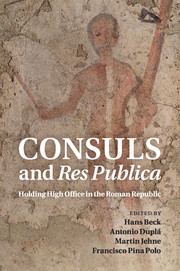Book contents
- Frontmatter
- Contents
- Preface
- Contributors
- The republic and its highest office: some introductory remarks on the Roman consulate
- Part I The creation of the consulship
- Part II Powers and functions of the consulship
- Part III Symbols, models, self-representation
- Part IV Ideology, confrontation and the end of the republican consulship
- Chapter 12 Consular appeals to the army in 88 and 87: the locus of legitimacy in late-republican Rome
- Chapter 13 Consules populares
- Chapter 14 The consulship of 78 bc. Catulus versus Lepidus: an optimates versus populares affair
- Chapter 15 Consulship and consuls under Augustus
- Bibliography
- Index of persons
- Subject index
Chapter 15 - Consulship and consuls under Augustus
from Part IV - Ideology, confrontation and the end of the republican consulship
Published online by Cambridge University Press: 07 September 2011
- Frontmatter
- Contents
- Preface
- Contributors
- The republic and its highest office: some introductory remarks on the Roman consulate
- Part I The creation of the consulship
- Part II Powers and functions of the consulship
- Part III Symbols, models, self-representation
- Part IV Ideology, confrontation and the end of the republican consulship
- Chapter 12 Consular appeals to the army in 88 and 87: the locus of legitimacy in late-republican Rome
- Chapter 13 Consules populares
- Chapter 14 The consulship of 78 bc. Catulus versus Lepidus: an optimates versus populares affair
- Chapter 15 Consulship and consuls under Augustus
- Bibliography
- Index of persons
- Subject index
Summary
It seems paradoxical to devote time to a study of consuls and the consulship under Augustus in a monograph dealing with the constitution of the Roman republic. Yet such a choice is perfectly justified when we remember that Augustus’ great skill was in situating the new regime and its modus operandi within a context of historical continuity. The significant consequence of this axiom is that the consulship under Augustus can be analyzed not only for its own sake and for its many evolving aspects, but also for what it teaches us about late-republican practices, many of which Augustus revived. The continuity between the Roman republic and the regime founded by Augustus appears to be more or less pronounced depending on whether we look at the consulship from a purely formal point of view or whether we look at the consuls and the position that the princeps allotted to them. The guiding line of the following demonstration will be to stress that if the office of the consulship was never the object of legal reforms aimed at weakening its powers, the holders of this magistracy would have had no other choice but to make do with the new political environment resulting from the seizure by a single man and his family of the res publica, from Actium onward. For Augustus and the consuls, the crux of the problem lay in finding a relationship that would prevent the latter from contesting the former's superiority without infringing on the very foundations of consular power and prestige.
Preliminary remarks and historiographical clarifications
The study of the consulship under Augustus has normally been dissociated from the study of the place occupied by those who held this magistracy, even though they are two complementary aspects of the same question. Purely institutional elements drew the attention of specialists at first, as of the nineteenth century. We must go back to Mommsen to find a method of analysis that can be applied to the central theme of the book and whose influence was felt throughout the twentieth century. In his Römisches Staatsrecht, he studied the consulship in volume ii, entirely devoted to the magistracies, in accordance with the spirit of a textbook viewing public law as a system and, to this end, endeavoring to provide a legal definition of the Roman res publica. The characteristic absence of any diachronic perspective distinguishes this original project from the multiple surveys dealing with the history of the institutions as they evolved, but this does not mean that Mommsen's Public Law is of no use in defining the place occupied by the consulship in the new regime. Indeed, references to the consulship under the empire are numerous in the chapter in question, reflecting the state of the sources, and several of these general remarks can be noted for their pertinence to the subject under study here.
- Type
- Chapter
- Information
- Consuls and Res PublicaHolding High Office in the Roman Republic, pp. 319 - 335Publisher: Cambridge University PressPrint publication year: 2011
- 2
- Cited by



